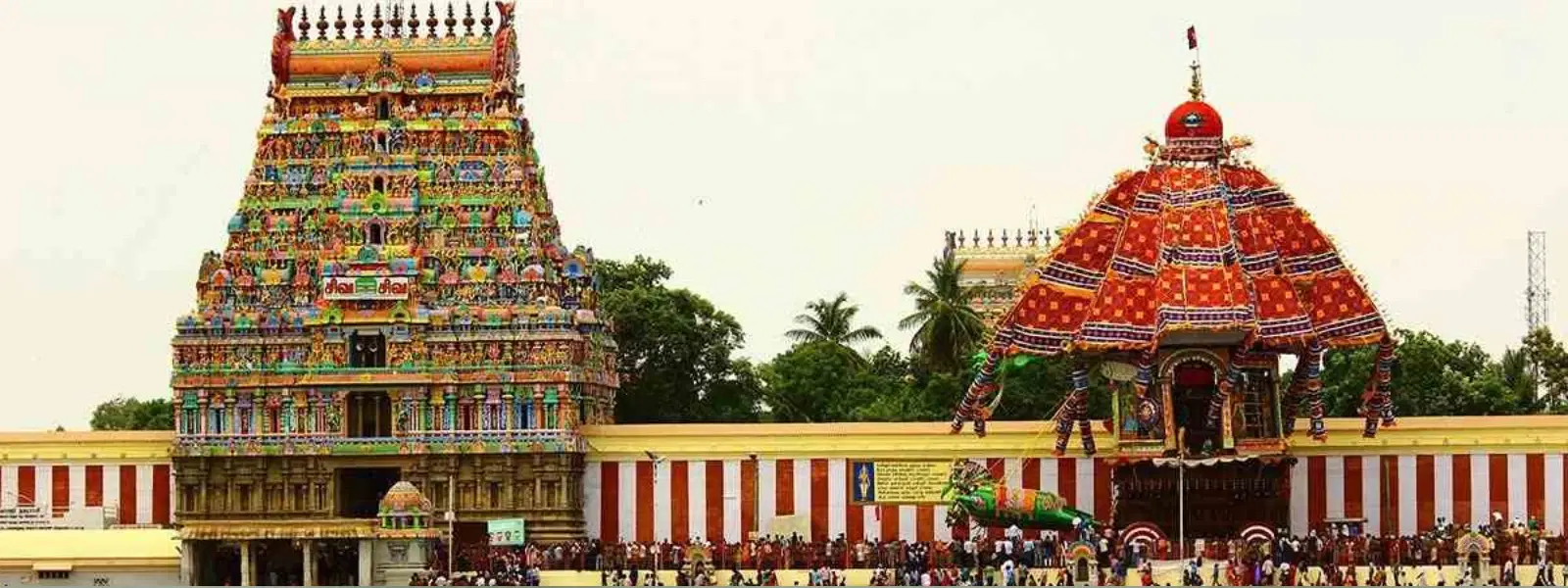
Hotels
•03 min read

The Tiruvarur Thyagaraja Temple stands as a living testament to Tamil Nadu's rich history and cultural vibrancy. Nestled in the heart of this ancient land, the temple draws visitors not only for its spiritual significance but also for the captivating traditions that have been preserved through the ages. This blog delves into 10 fascinating traditions that make this temple a treasure trove of heritage, offering insights into its rituals, festivals, exquisite architecture, and religious practices.
Steeped in legend and lore, the Tiruvarur Thyagaraja Temple carries the imprints of the Chola dynasty and the deep-rooted narratives found in Tamil literature. According to myth, the story of Lord Thyagaraja is intertwined with the legends of the Nayanmars, revered saints who championed devotion. These ancient stories not only illuminate the temple's past but also enrich its spiritual aura, drawing pilgrims in search of divine blessings and cultural wisdom.
The temple is a masterpiece of South Indian architecture. Its sprawling layout, intricate carvings, and the iconic temple chariot illustrate the profound influence of Tamil Nadu's spiritual traditions. This architectural marvel reflects a stylistic fusion of art and devotion, symbolizing the harmonious blend of history and faith that characterizes Tiruvarur's cultural heritage.
Every day at the temple begins with a series of poojas and abhishekams—sacred rituals designed to honor Lord Thyagaraja. These devotional practices are performed with meticulous care, resonating deeply with the broader context of Tamil Nadu's religious customs. For devotees, these moments offer a sense of peace and a connection to the divine.
A unique aspect of the temple's ritualistic offerings is the Ajapa Natanam. This mesmerizing dance ritual, performed with deep spiritual intent, celebrates the deity in graceful movements. The performance is not just art—it is a symbolic expression of devotion that reinforces the temple’s religious significance and cultural vitality.

One cannot speak of Tiruvarur without mentioning the grandeur of the Chariot Festival. Known locally as Ther Thiruvizha, this annual festival is an extraordinary display of devotion and community spirit. The massive temple chariot, elaborately decorated and drawn through the streets, serves as a moving symbol of faith and unity. This festival is a vivid showcase of Tamil Nadu temple festivals and attracts thousands of devotees every year.
Apart from the Chariot Festival, the temple comes alive during other significant celebrations such as Panguni Uthiram and Arudra Darshan. These festivals further cement the temple's role in promoting Tamil Nadu's spiritual traditions, each ritual and observance offering a unique glimpse into the cultural heritage of Tiruvarur.
The Tiruvarur Thyagaraja Temple is not only a place of worship but also a nurturing ground for Carnatic music and devotional arts. The temple has long been associated with musical legends and is instrumental in preserving South Indian musical traditions. Devotees often find that the strains of classical compositions echo through its corridors, creating an atmosphere where art and spirituality converge.
The temple serves as an important pilgrimage site for many, reinforcing social bonds and sparking deep communal devotion. By bringing together people from various walks of life, it fosters an environment of unity and shared cultural pride. The involvement of the local community in temple festivities underscores the living nature of these traditions, ensuring they thrive for future generations.
At the heart of the temple’s spiritual allure is Lord Thyagaraja, whose symbolism transcends mere religious iconography. He embodies the philosophical teachings that encourage self-realization and the pursuit of truth, standing as a beacon of hope for many. His presence at the temple instills a sense of divine grace that has been celebrated through centuries of religious practice.

Beyond its religious functions, the Tiruvarur Thyagaraja Temple actively preserves the cultural legacy of South Indian temple customs. It acts as a custodian of traditions that evoke the spirit of Tamil Nadu. The meticulous upkeep of rituals and festivals not only honors age-old practices but also nurtures a vibrant community connected through shared beliefs and values.
Insight Corner: "Did You Know? The Tiruvarur Thyagaraja Temple houses the largest temple chariot in India, a testament to the architectural and cultural grandeur of Tamil Nadu’s spiritual traditions."
The Tiruvarur Thyagaraja Temple stands out for its massive temple chariot, unique rituals like the Ajapa Natanam, and its pivotal role in preserving Carnatic music traditions.
Tiruvarur is celebrated for its rich cultural heritage, with the Thyagaraja Temple at its heart, serving as a center for temple festivals, devotional practices, and South Indian musical traditions.
The most famous festival celebrated here is the annual Chariot Festival or Ther Thiruvizha, known for its elaborate preparations and massive procession that attracts thousands of devotees.
The traditions of the Tiruvarur Thyagaraja Temple offer a deep insight into the cultural and spiritual fabric of Tamil Nadu. From its historical roots and unique architectural splendor to its vibrant festivals and devotional practices, the temple stands as a pillar of South Indian heritage. It continues to inspire awe and unity among devotees and visitors alike, urging everyone to explore and cherish the profound legacy of Tiruvarur's spiritual traditions.